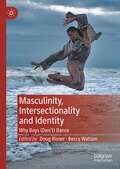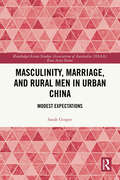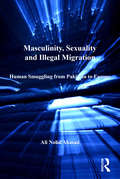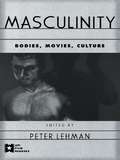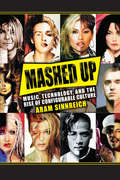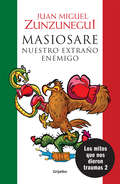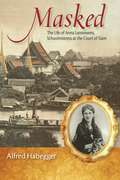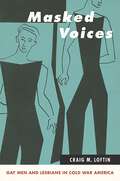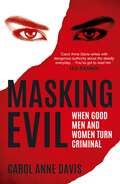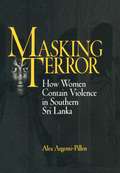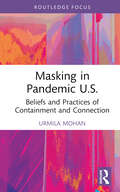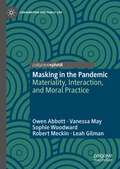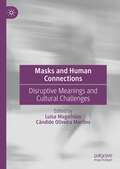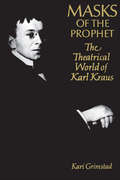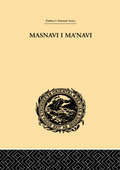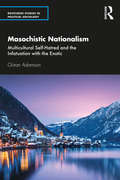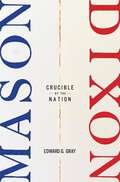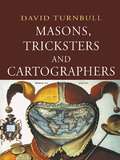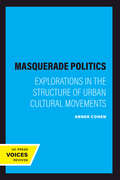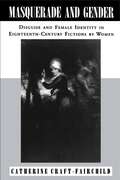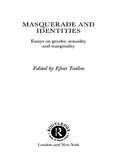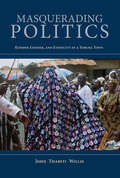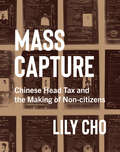- Table View
- List View
Masculinity, Intersectionality and Identity: Why Boys (Don’t) Dance
by Beccy Watson Doug RisnerThis unparalleled collection, international and innovative in scope, analyzes the dynamic tensions between masculinity and dance. Introducing a lens of intersectionality, the book’s content examines why, despite burgeoning popular and contemporary representations of a normalization of dancing masculinities, some boys don’t dance and why many of those who do struggle to stay involved. Prominent themes of identity, masculinity, and intersectionality weave throughout the book’s conceptual frameworks of education and schooling, cultures, and identities in dance. Incorporating empirical studies, qualitative inquiry, and reflexive accounts, Doug Risner and Beccy Watson have assembled a unique volume of original chapters from established scholars and emerging voices to inform the future direction of interdisciplinary dance scholarship and dance education research. The book’s scope spans several related disciplines including gender studies, queer studies, cultural studies, performance studies, and sociology. The volume will appeal to dancers, educators, researchers, scholars, students, parents, and caregivers of boys who dance. Accessible at multiple levels, the content is relevant for undergraduate students across dance, dance education, and movement science, and graduate students forging new analysis of dance, pedagogy, gender theory, and teaching praxis.
Masculinity, Marriage and Rural Men in Urban China: Modest Expectations (Routledge/Asian Studies Association of Australia (ASAA) East Asian Series)
by Sarah GosperThis book explores the conjuncture and interrelationship between three so-called ‘crises’ facing Chinese society: a crisis of marriage, a crisis of masculinity and a crisis of mobility.Based on sustained ethnographic research on unmarried lower-class rural men from two distinct social and class categories, namely migrant workers employed in the food delivery and express mail delivery industries and tertiary educated, white collar professionals, the book reveals how the increasing socio-economic precarity of rural men and their largely unrealised desires to marry and have children demonstrates a fundamental reconfiguration of Chinese masculinity and mobility in urban China and the social impact on central Chinese institutions. The book also reveals the futile efforts to fulfil hegemonic models of masculinity in contemporary China and addresses the heterogeneity of unmarried lower-class rural men as they navigate marriage, manhood and mobility.Exploring gender relations in China and contributing to global studies of heterosexual masculinities, this book will appeal to students and scholars of Chinese culture and society, gender studies and social anthropology.
Masculinity, Sexuality and Illegal Migration: Human Smuggling from Pakistan to Europe (Studies in Migration and Diaspora)
by Ali Nobil AhmadMasculinity, Sexuality and Illegal Migration makes use of extensive new empirical material to explore the phenomena of migration, human smuggling and illegal work, in order to develop a compelling account of international migration, linking it with irrational, risky economic behaviour and male sexual desire. Interviews conducted with successive waves of Pakistani immigrants in the UK and Italy, together with ethnographic fieldwork amongst local journalists, immigration officials and smugglers in Pakistan, serve as the basis for an interdisciplinary comparative analysis of illegal migration across time and space. Challenging the received idea that labour migration is driven purely by rational economic forces, Masculinity, Sexuality and Illegal Migration draws upon psychoanalytic social theory to examine the roles of masculinity and irrationality in the decision to migrate, thus stimulating a more complex debate about migration's causes and consequences. The arguments it makes raise wider questions about the folly of thinking about economic concerns in isolation from other aspects of human experience. As such, this book will appeal to those with research interests in economics, social theory, migration, gender and sexuality, and race and ethnicity.
Masculinity: Bodies, Movies, Culture (AFI Film Readers)
by Peter LehmanLehman brings together new work on masculinity in film by established film scholars, new academics, performance artists, and cultural critics. The essays analyze trends from the role of gay men in saving heterosexuality to the emergence of new queer cinema.
Mashed Up: Music, Technology, and the Rise of Configurable Culture
by Aram SinnreichFrom ancient times to the present day, writers and thinkers have remarked on the unique power of music to evoke emotions, signal identity, and bond or divide entire societies, all without the benefit of literal representation. Even if we can't say precisely what our favorite melody means, we know very well what kind of effect it has on us, and on our friends and neighbors. According to Aram Sinnreich, this power helps to explain why music has so often been regulated in societies around the globe and throughout history. Institutional authorities ranging from dynastic China's "Office to Harmonize Sounds" to today's copyright collecting societies like BMI and ASCAP leverage the rule of law and the power of the market to make sure that some musical forms and practices are allowed and others are prohibited. Yet, despite the efforts of these powerful regulators, musical cultures consistently devise new and innovative ways to work around institutional regulations. These workarounds often generate new styles and traditions in turn, with effects far beyond the cultural sphere. Mashed Up chronicles the rise of "configurability," an emerging musical and cultural moment rooted in today's global, networked communications infrastructure. Based on interviews with dozens of prominent DJs, attorneys, and music industry executives, the book argues that today's battles over sampling, file sharing, and the marketability of new styles such as "mash-ups" and "techno" presage social change on a far broader scale. Specifically, the book suggests the emergence of a new ethic of configurable collectivism; an economic reunion of labor; a renegotiation of the line between public and private; a shift from linear to recursive logic; and a new "DJ consciousness," in which the margins are becoming the new mainstream. Whether these changes are sudden or gradual, violent or peaceful, will depend on whether we heed the lessons of configurability, or continue to police and punish the growing ranks of the mashed up.
Masiosare, nuestro extraño enemigo: Los mitos que nos dieron traumas 2
by Juan Miguel ZunzuneguiDespués del éxito rotundo de Los mitos que nos dieron traumas, llega la esperada segunda parte. México necesita una transformación. Sólo tú puedes hacerla. Juan Miguel Zunzunegui nuevamente nos quita la venda de los ojos para hacernos responsables del país y de sus circunstancias. Masiosare se esconde en el pasado, en la profundidad de nuestra mente, y detrás de muchos de nuestros mitos. Está oculto en lo profundo del inconsciente colectivo de México y el mexicano, en sus condicionamientos psicológicos y patrones de conducta, en su gandallismo y su chingonería, en su violencia disfrazada de machismo y de honor herido, en su mente racista e inquisidora, clasista e intolerante. Masiosare, nuestro extraño enemigo, es un libro que hace una serie de viajes al pasado de México y la mente de los mexicanos, para comprender los mitos y traumas que nos destruyen como país y nos dividen como pueblo. En un México que no cesa de destruirse a sí mismo, Juan Miguel Zunzunegui hace, en esta revisión histórica, el llamado a la paz y la colaboración que el país necesita para sobrevivir.
Masked
by Alfred HabeggerA brave British widow goes to Siam and-by dint of her principled and indomitable character-inspires that despotic nation to abolish slavery and absolute rule: this appealing legend first took shape after the Civil War when Anna Leonowens came to America from Bangkok and succeeded in becoming a celebrity author and lecturer. Three decades after her death, in the 1940s and 1950s, the story would be transformed into a powerful Western myth by Margaret Landon's best-selling book "Anna and the King of Siam" and Rodgers and Hammerstein's musical "The King and I. " But who was Leonowens and why did her story take hold? Although it has been known for some time that she was of Anglo-Indian parentage and that her tales about the Siamese court are unreliable, not until now, with the publication of "Masked," has there been a deeply researched account of her extraordinary life. Alfred Habegger, an award-winning biographer, draws on the archives of five continents and recent Thai-language scholarship to disclose the complex person behind the mask and the troubling facts behind the myth. He also ponders the curious fit between Leonowens's compelling fabrications and the New World's innocent dreams-in particular the dream that democracy can be spread through quick and easy interventions. Exploring the full historic complexity of what it once meant to pass as white, "Masked" pays close attention to Leonowens's midlevel origins in British India, her education at a Bombay charity school for Eurasian children, her material and social milieu in Australia and Singapore, the stresses she endured in Bangkok as a working widow, the latent melancholy that often afflicted her, the problematic aspects of her self-invention, and the welcome she found in America, where a circle of elite New England abolitionists who knew nothing about Southeast Asia gave her their uncritical support. Her embellished story would again capture America's imagination as World War II ended and a newly interventionist United States looked toward Asia. "
Masked Voices: Gay Men and Lesbians in Cold War America (SUNY series in Queer Politics and Cultures)
by Craig M. LoftinFinalist for the 2013 Over the Rainbow Selection presented by the Gay, Lesbian, Bisexual, and Transgendered Round Table (GLBTRT) of the American Library AssociationIn this compelling social history, Craig M. Loftin describes how gay people in the United States experienced the 1950s and early 1960s, a time when rapidly growing gay and lesbian subcultures suffered widespread discrimination. The book is based on a remarkable and unique historical source: letters written to ONE magazine, the first openly gay publication in the United States. These letters, most of which have never before been published, provide extraordinary insight into the experiences, thoughts, and feelings of gay men and lesbians nationwide, especially as they coped with the anxieties of the McCarthy era. The letters reveal how gay people dealt with issues highly relevant to LGBT life today, including job discrimination, police harassment, marriage, homophobia in families, and persecution in churches and the military. Loftin shows that gay men and lesbians responded to intolerance and bigotry with resilience, creativity, and an invigorated belief in their right to live their lives as gay men and lesbians long before this was accepted and considered safe. Groundbreaking chapters address gay marriage and family life, international gay activism, and how antigay federal government policies reverberated throughout the country.
Masking Evil: When Good Men and Women Turn Criminal
by Carol Anne DavisIn this collection of incisive profiles, veteran crime writer Carol Anne Davis turns the spotlight on men and women from good backgrounds who crossed the line into depravity. Whether a model pupil, a trusted member of the clergy or the chief of police, these otherwise ordinary people revealed their hidden capacity for the darkest crimes.
Masking Evil: When Good Men and Women Turn Criminal
by Carol Anne DavisIn this collection of incisive profiles, veteran crime writer Carol Anne Davis turns the spotlight on men and women from good backgrounds who crossed the line into depravity. Whether a model pupil, a trusted member of the clergy or the chief of police, these otherwise ordinary people revealed their hidden capacity for the darkest crimes.
Masking Terror
by Alex Argenti-PillenIn Sri Lanka, staggering numbers of young men were killed fighting in the armed forces against Tamil separatists. The war became one of attrition--year after year waves of young foot soldiers were sent to almost certain death in a war so bloody that the very names of the most famous battle scenes still fill people with horror. Alex Argenti-Pillen describes the social fabric of a rural community that has become a breeding ground and reservoir of soldiers for the Sri Lankan nation-state, arguing that this reservoir has been created on the basis of a culture of poverty and terror.Focusing on the involvement of the pseudonymous village of Udahenagama in the atrocities of the civil war of the late 1980s and the interethnic war against the Tamil guerrillas, Masking Terror describes the response of women in the rural slums of southern Sri Lanka to the further spread of violence. To reconstruct the violent backgrounds of these soldiers, she presents the stories of their mothers, sisters, wives, and grandmothers, providing a perspective on the conflict between Sinhalese and Tamil populations not found elsewhere. In addition to interpreting the impact of high levels of violence on a small community, Argenti-Pillen questions the effects of trauma counseling services brought by the international humanitarian community into war-torn non-Western cultural contexts. Her study shows how Euro-American methods for dealing with traumatized survivors poses a threat to the culture-specific methods local women use to contain violence.Masking Terror provides a sobering introduction to the difficulties and methodological problems field researchers, social scientists, human rights activists, and mental health workers face in working with victims and perpetrators of ethnic and political violence and large-scale civil war. The narratives of the women from Udahenagama provide necessary insight into how survivors of wartime atrocities reconstruct their communicative worlds and disrupt the cycle of violence in ways that may be foreign to Euro-American professionals.
Masking in Pandemic U.S.: Beliefs and Practices of Containment and Connection (Routledge Focus on Anthropology)
by Urmila MohanThis anthropological study explores the beliefs and practices that emerged around masking in the U.S. during the COVID-19 pandemic. Americans responded to this illness as unique subjects navigating the flux of social and corporeal boundaries, supporting certain beliefs and acting to shape them as compelling realities. Debates over health and safety mandates indicated that responses were fractured with varied subjectivities in play—people lived in different worlds and bodies were central in conflicts over breathing, masking and social distancing. Contrasting approaches to practices marked the limits and possibilities of imaginaries, signaling differences and similarities between groups, and how actions could be passageways between people and possibilities. During a time of uncertainty and loss, the "efficacious intimacy" of bodies and materials embedded beliefs, values, and emotions of care in mask sewing and usage. By exploring these practices, the author reflects on how American subjects became relational selves and sustained response-able communities, helping people protect each other from mutating viruses as well as moving forward in a shifting terrain of intimacy and distance, connection, and containment.
Masking in the Pandemic: Materiality, Interaction, and Moral Practice (Consumption and Public Life)
by Sophie Woodward Vanessa May Owen Abbott Leah Gilman Robert MeckinThis book assumes an “everyday life” perspective towards masking in public spaces in the UK during the Covid-19 pandemic. Facemasks are perhaps one of the most tangible ways in which the changes wrought by the Covid-19 pandemic were made visible. In the space of a few months in 2020, masking in the UK went from being almost non-existent in public to becoming widespread, both before and after the UK government mandated masking in most enclosed public spaces in July 2020. In this context, the speed and scale of the introduction of masking in public settings offers sociologists a rare chance to document the (contested) emergence of a new social practice. We argue that the nature of masking during the pandemic means that masking practices need to be understood through the entwinement of material, interactional, and moral dimensions. We develop a relational perspective to explore the relationship between the materiality and moral significance of masking, and how this translated into the development of masking practices in public spaces. The authors argue further that the specific context of masking during the pandemic provides sociologists with a unique lens to think through the nature of material, interactional, and moral practices in general.
Masks and Human Connections: Disruptive Meanings and Cultural Challenges
by Luísa Magalhães Cândido Oliveira MartinsThis interdisciplinary collection explores four distinct perspectives about the mask, as object of use for protection, identity, and disguise. In part I, contributors address human identities within collective social performance, with chapters on performativity and the far right and masked identities in political resistance and communication. Part II focuses on the mask as a signifying object with strong representational challenges, exploring representations in festivals, literature, and film. Part III investigates the ambiguous use of the mask as a protective and concealing element, delving into visual culture and digital social media contexts. Finally, Part VI draws on the work of Levinas and Deleuze to investigate a philosophical view of the mask that addresses memory and ethics within intersubjective relationships. Questioning the contemporary world, using communication, sociology, visual culture, and philosophical theory, the volume provides a pedagogical and formative perspective on the mask.
Masks of the Prophet: The Theatrical World of Karl Kraus
by Karl Grimstad'When the name "Hitler" is mentioned, nothing occurs to me' – so said Karl Kraus. For this leading Viennese Jewish critic and intellectual the touchstone of art was ethics. How could he be speechless in the face of a threat to all that ethics means? To answer this question, the author makes a detailed chronological study of Kraus's intellectual activity as reflected in his work on the theatre. The results are presented in five chapters, each dealing with a different 'mask' adopted by Kraus during the period 1892-1936. Grimstad considers not only theatre and drama criticism in Die Fackel and Kraus's dramatic writings, but also biographical data, to help uncover the rationale of his work. That rationale is the logic of the theatrical mode in which he lived and wrote. The stage was not only his subject matter, it determined what he would see and say. Grimstad argues that when Kraus wrote, his words were the speech of an 'actor' who was often infatuated with himself and obsessed with the need to overwhelm his rival 'actors.' When Hitler's storm-troopers began their march, he could say nothing for the world in which his thought took shape had become a world of theatrics, not 'Realpolitik.' Kraus criticized plays without reading them and performances without seeing them, obsessed with the belief that his was the voice of all that was true, good, and beautiful. Grimstad observes that he was a prophet who confused the divine inspiration with the Thespian urge, playing to an audience, using a mask for each of his roles, yet thinking he spoke to all mankind, bringing them pure ethos. This volume will be of particular interest to those working in the fields of theatre criticism, comparative literature, German literature, and Jewish intellectual history.
Masnavi I Ma'navi: The Spiritual Couplets of Maulana Jalalu-'D-Din Muhammad Rumi
by E.H. WhinfieldFirst Published in 2000. This text is a compliation of spiriutal couplets and teachings of Maulana Jalalu-'D-Din Muhammad Rumi. The Masnavi is a summary of the religious sentiments and doctrine of Islam as interpreted and modified by Muhammadan Mystics or Sufis. Includes 6 books, from works in 1898.
Masochistic Nationalism: Multicultural Self-Hatred and the Infatuation with the Exotic (Routledge Studies in Political Sociology)
by Göran AdamsonThis book examines the nature of the conflict between right-wing populism and multiculturalism: the West’s defining conflict in the modern age. Drawing on a plethora of evidence from politics and culture in the West, it argues that these two positions, while antagonistic on the surface, are in fact similar: nationalism and multiculturalism are two names for one idea, the difference between them being simply a matter of geography; both outlooks have their roots in romanticism, sentimentalism, arrogance and a racist outlook. Rather than defend either approach, this volume urges us to consider the importance of roots and argues for greater consideration of what classical liberalism, socialism and feminism can do to break this impasse in our political thinking, with a concern for equality and concern for solidarity, regardless of cultural practice. As such it will appeal to social and political theorists with interests in political sociology and culture.
Mason-Dixon: Crucible of the Nation
by Edward G. GrayThe first comprehensive history of the Mason-Dixon Line—a dramatic story of imperial rivalry and settler-colonial violence, the bonds of slavery and the fight for freedom.The United States is the product of border dynamics—not just at international frontiers but at the boundary that runs through its first heartland. The story of the Mason-Dixon Line is the story of America’s colonial beginnings, nation building, and conflict over slavery.Acclaimed historian Edward Gray offers the first comprehensive narrative of the America’s defining border. Formalized in 1767, the Mason-Dixon Line resolved a generations-old dispute that began with the establishment of Pennsylvania in 1681. Rivalry with the Calverts of Maryland—complicated by struggles with Dutch settlers in Delaware, breakneck agricultural development, and the resistance of Lenape and Susquehannock natives—had led to contentious jurisdictional ambiguity, full-scale battles among the colonists, and ethnic slaughter. In 1780, Pennsylvania’s Act for the Gradual Abolition of Slavery inaugurated the next phase in the Line’s history. Proslavery and antislavery sentiments had long coexisted in the Maryland–Pennsylvania borderlands, but now African Americans—enslaved and free—faced a boundary between distinct legal regimes. With the passage of the Fugitive Slave Act in 1850, the Mason-Dixon Line became a federal instrument to arrest the northward flow of freedom-seeking Blacks. Only with the end of the Civil War did the Line’s significance fade, though it continued to haunt African Americans as Jim Crow took hold.Mason-Dixon tells the gripping story of colonial grandees, Native American diplomats, Quaker abolitionists, fugitives from slavery, capitalist railroad and canal builders, US presidents, Supreme Court justices, and Underground Railroad conductors—all contending with the relentless violence and political discord of a borderland that was a transformative force in American history.
Masons, Tricksters and Cartographers: Comparative Studies in the Sociology of Scientific and Indigenous Knowledge (Studies In The History Of Science, Technology And Medicine Ser.)
by David TurnbullIn an eclectic and highly original study, Turnbull brings together traditions as diverse as cathedral building, Micronesian navigation, cartography and turbulence research. He argues that all our differing ways of producing knowledge - including science - are messy, spatial and local. Every culture has its own ways of assembling local knowledge, thereby creating space thrugh the linking of people, practices and places. The spaces we inhabit and assemblages we work with are not as homogenous and coherent as our modernist perspectives have led us to believe - rather they are complex and heterogeneous motleys.
Masquerade Politics: Explorations in the Structure of Urban Cultural Movements
by Abner CohenCarnival, that image of sensuous frivolity, is shown by Abner Cohen to be a masquerade for the dynamic relations between culture and politics. His masterful study details the transformation of a local, polyethnic London fair to a massive, exclusively West Indian carnival, known as "Europe's biggest street festival," which in 1976 occasioned a bloody confrontation between black youth and the police and which has since become a fiercely contested cultural event.Cohen contrasts the development of the London carnival with the development of other carnivalesque movements, including the Renaissance Pleasure Faire of California. His valuable analysis of these relatively little-explored urban cultural movements advances further the theoretical formulations developed in his previous studies.
Masquerade and Gender: Disguise and Female Identity in Eighteenth-Century Fictions by Women (G - Reference, Information and Interdisciplinary Subjects)
by Catherine A. Craft-FairchildTerry Castle's recent study of masquerade follows Bakhtin's analysis of the carnivalesque to conclude that, for women, masquerade offered exciting possibilities for social and sexual freedom. Castle's interpretation conforms to the fears expressed by male writers during the period—Addison, Steele, and Fielding all insisted that masquerade allowed women to usurp the privileges of men. Female authors, however, often mistrusted these claims, perceiving that masquerade's apparent freedoms were frequently nothing more than sophisticated forms of oppression. Catherine Craft-Fairchild's work provides a useful corrective to Castle's treatment of masquerade. She argues that, in fictions by Aphra Behn, Mary Davys, Eliza Haywood, Elizabeth Inchbald, and Frances Burney, masquerade is double-sided. It is represented in some cases as a disempowering capitulation to patriarchal strictures that posit female subordination. Often within the same text, however, masquerade is also depicted as an empowering defiance of the dominant norms for female behavior. Heroines who attempt to separate themselves from the image of womanhood they consciously construct escape victimization. In both cases, masquerade is the condition of femininity: gender in the woman's novel is constructed rather than essential.Craft-Fairchild examines the guises in which womanhood appears, analyzing the ways in which women writers both construct and deconstruct eighteenth-century cultural conceptions of femininity. She offers a careful and engaging textual analysis of both canonical and noncanonical eighteenth-century texts, thereby setting lesser-read fictions into a critical dialogue with more widely known novels. Detailed readings are informed throughout by the ideas of current feminist theorists, including Luce Irigaray, Julia Kristeva, Mary Ann Doane, and Kaja Silverman. Instead of assuming that fictions about women were based on biological fact, Craft-Fairchild stresses the opposite: the domestic novel itself constructs the domestic woman.
Masquerade and Identities: Essays on Gender, Sexuality and Marginality
by Efrat TseëlonMasquerade, both literal and metaphorical, is now a central concept on many disciplines. This timely volume explores and revisits the role of disguise in constructing, expressing and representing marginalised identities, and in undermining easy distinctions between 'true' identity and artifice.The book is interdisciplinary in approach, spanning a diverse range of cultures and narrative voices. It provides provocative and nuanced ways of thinking about masquerade as a tool for construction, and a tool for critique. The essays interrogate such themes as:*mask and carnival*fetish fashion*stigma of illegitimacy*femininity as masquerade*lesbian masks*cross-dressing in Jewish folk theatre*the mask in seventeenth and eighteenth century London and nineteenth century France*the voice as mask.
Masquerading Politics: Kinship, Gender, and Ethnicity in a Yoruba Town
by John Thabiti WillisIn West Africa, especially among Yoruba people, masquerades have the power to kill enemies, appoint kings, and grant fertility. John Thabiti Willis takes a close look at masquerade traditions in the Yoruba town of Otta, exploring transformations in performers, performances, and the institutional structures in which masquerade was used to reveal ongoing changes in notions of gender, kinship, and ethnic identity. As Willis focuses on performers and spectators, he reveals a history of masquerade that is rich and complex. His research offers a more nuanced understanding of performance practices in Africa and their role in forging alliances, consolidating state power, incorporating immigrants, executing criminals, and projecting individual and group power on both sides of the Afro-Atlantic world.
Mass Appeal
by Edward D. BerkowitzMass Appeal describes the changing world of American popular culture from the first sound movies through the age of television. In short vignettes, the book reveals the career patterns of people who became big movie, TV, or radio stars. Eddie Cantor and Al Jolson symbolize the early stars of sound movies. Groucho Marx and Fred Astaire represent the movie stars of the 1930s, and Jack Benny stands in for the 1930s performers who achieved their success on radio. Katharine Hepburn, a stage and film star, illustrates the cultural trends of the late 1930s and early 1940s. Humphrey Bogart and Bob Hope serve as examples of performers who achieved great success during the Second World War. Walt Disney, Woody Allen, and Lucille Ball, among others, become the representative figures of the postwar world. Through these vignettes, the reader comes to understand the development of American mass media in the twentieth century.
Mass Capture: Chinese Head Tax and the Making of Non-citizens
by Lily ChoUnder the terms of the Chinese Immigration Act of 1885, Canada implemented a vast protocol for acquiring detailed personal information about Chinese migrants. Among the bewildering array of state documents used in this effort were CI 9s: issued from 1885 to 1953, they included date of birth, place of residence, occupation, identifying marks, known associates, and, significantly, identification photographs. The originals were transferred to microfilm and destroyed in 1963; more than 41,000 grainy reproductions of CI 9s remain.Lily Cho explores how the CI 9s functioned as a form of surveillance and a process of mass capture that produced non-citizens, revealing the surprising dynamism of non-citizenship constantly regulated and monitored, made and remade, by an anxious state. The first mass use of identification photography in Canada, they make up the largest archive of images of Chinese migrants in the country, including people who stood no chance of being photographed otherwise. But CI 9s generated far more information than could be processed, and there is nothing straightforward about the knowledge that they purported to contain. Cho finds traces of alternate forms of kinship in the archive as well as evidence of the ways that families were separated. In attending to the particularities of these images and documents, Mass Capture uncovers the alternative story that lies in the refusals and resistances enacted by the mass captured.Illustrated with painstakingly reconstituted digital reproductions of the microfilm record, Mass Capture reclaims the CI 9s as more than documents of racist repression, suggesting the possibilities for beauty and dignity in the archive, for captivation as well as capture.
